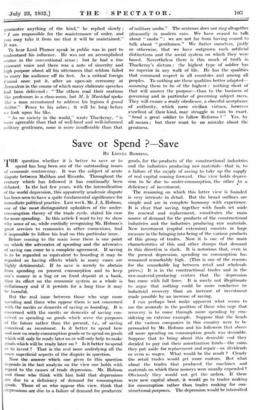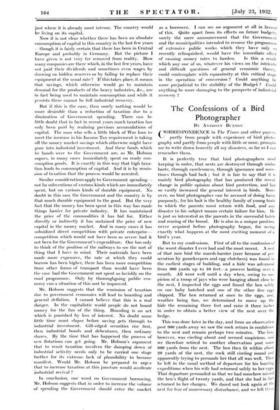Save or Spend ? Save
By LIONEL ROBBINS.
T" question whether it is better to save or to spend has long been one of the -outstanding issues of economic controversy. It was the subject of acute 'dispute between Malthus and Ricardo. Throughout the century which has followed it has continually been -debated.' In the last few years, with the intensification -of the world depression, this apparently academic dispute has been seen-to have a quite fundamental significance for -immediate political practice. Last week, Mr. J. A. Hobson, one of -the most distinguished upholders of the under- consumption theory. of the trade cycle, stated his case for more-spending. In this article I want to try to show :why some of us,- while cordially recognizing Mr. Hobson's 'great services to economics in other connexions, find -it impossible to follow his lead on -this particular issue.
Before coming to the main issue there is one point ' on which the advocates- of spending and the advocates of saving can come to a complete agreement. If saving is to be regarded as- equivalent to hoarding it may be -regarded as having effects which in many cases are . highly detrimental:. If to save is merely to abstain from spending on present consumption and to keep .one's money in a bag or on fixed deposit at a bank, 'then its effect on the. economic system as a whole is -deflationary and if. it persists for a long time it may . be harmful.
But the real issue between those who urge more -spending and those .who oppose them is- not concerned with the merits or demerits of saving as hoarding. It is concerned. with, the- merits or demerits of saving con- ceived as spending on goods which serve the purposes of the future -rather than the present, i.e., of saving • conceived as investment. Is it better to spend here and now on ready consumption goods or to spend on goods . which will only be ready later on or-will only help to make goods.which will be ready later on ? Is it better to spend or to invest ? That is the real" issue underlying the more superficial aspects of the dispute in question. : Now the answer which one gives to this question depends in the-last analysis on the view one holds with • regard to the causes of trade depression. Mr. Hobson and those who think . with him hold that depressions . are due to a. deficiency of demand for consumption goods. Those of us who- oppose this view, think that • depressions are flue, to a failure of demand for producers' goods, for the products of the constructional industries and the industries producing raw materials—that is, to a failure of the supply of saving to take up the supply of real capital coming forward. One view holds depreg- sion to be due to under-consumption, the other to a deficiency of investment.
The reasoning, on which this latter view is founded is very intricate in detail. But the broad outlines are simple and are in complete harmony with experience. It is clear that saving, together with funds set aside for renewal and replacement, constitutes the main source of demand for the products of the constructional industries and the industries producing raw materials. New investment (capital extension) consists in large measure in the bringing into being of the various products -of this group of trades. Now it is one of the main characteristics- of this and other slumps that demand in this direction is slack. It is notorious that, even in the present depression, spending on consumption has remained remarkably high. (This is one of the reasons for the remarkable lag between retail and wholesale prices.) It is in the constructional trades and in the raw-material-producing centres that the ' depression -has come with full force. 'It is surely not illegitimate to argue that nothing could be more conducive to industrial recovery than an increase of investment made possible by an increase of saving.
I can perhaps best make apparent what seems to me the anomaly in the position of those who urge that recovery is to come through more spending by con- -sidering an extreme example. Suppose that the heads .of the various companies in this country were to be persuaded by Mr. Hobson and his followers that above all more spending on consumption goods was desirable. Suppose that to bring about this desirable end they decided to pay out their amortization funds—the sums they put aside for replacement and repair—as dividends or even as wages. What would be the result ? Clearly the retail trades would get more custom. But what 'about 'the trades that, produced the machines and materials on which these moneys were usually expended ? Obviously they would not get the. orders. If thew were new capital about,- it would -go to trades making for consumption rather than trades making for con- structional purposes. The depression would be intensified just where it is already most intense. The country would be living on its capital. Now it is not clear whether there has been an -absolute consumption of capital in this country in the last few years —though it is fairly certain that there has been in Central Europe and probably in Germany. But the picture I have given is not very far removed from reality. How many companies are there which, in the last few years, have not paid their dividends and sometimes even wages by drawing on hidden reserves or by failing to replace their equipment at the usual rate ? If this takes place, it means that savings, which otherwise would go to maintain demand for the products of the heavy industries, &e., are in fact being used to maintain consumption and while it persists there cannot be full industrial recovery.
But if this is the case, then surely nothing would be more desirable than a reduction of taxation due to a diminution of Government spending. There can be little doubt that in fact in recent years much taxation has only been paid by realizing previous accumulations of capital. The man who sells a little block of War loan to meet the increase in his Income Tax requirement is taking off the money market savings which otherwise might have gone into industrial investment. And these funds which he bands over to the Government are, as Mr. Hobson argues, in many eases immediately spent on ready con- sumption goods. It is exactly in this way that high taxa- tion leads to consumption of capital. And it is by remis- sion of taxation that the process would be arrested.
Similar considerations apply to Government spending— not Tin subventions of various kinds which are immediately spent, but on various kinds of durable equipment. No doubt in this case the Government and the country is by that much durable equipment to the good... But the very fact that the money has been spent in this way has made things harder for private industry. It has maintained the price of the commodities it has bid for. Either directly or indirectly it has sustained the price of new capital in the money market. And in many cases it has subsidized direct competition with private enterprise— competition which would not have been so severe had it not been for the Government's expenditure. One has only to think of the position of the railways to see the sort of thing that I have in mind. Their materials have been made more expensive, the rate at which they could borrow has been higher, there has been more competition from other forms of transport than would have been the ease had the Government not spent so lavishly on the road programme. Only by thoroughgoing public eco- nomy can a situation of this sort be improved.
Mr. Hobson suggests that the remission of taxation due to government economies will lead to hoarding and general deflation. I cannot believe that this is a real danger. In the capitalistic world people do not hoard money for the fun of the thing. Hoarding is an act . .which is punished by loss of interest No doubt some little time must elapse before saving gets through to .industrial . investment: Gilt-edged securities rise first, then industrial bonds and debentures, then ordinary shares. By the time that has happened the process of new flotations can get going. Mr. Hobson's argument that. to remit taxation involves the damping down of industrial activity needs only to be carried one stage further for its extreme lack of plausibility to become manifest. Would Mr. Hobson be prepared to argue that to increase taxation at this juncture would accelerate industrial revival ?
In conclusion, one word on Government borrowing. Mr. Hobson suggests that in order to increase the volume of spending the Government should enter the market as .a borrower. I can see no argument at all in favour of this. Quite apart from its effects on future budgets, surely the :mere announcement that the Government and the Municipalities intended to resume the programme Of extensive public works which they have Only so recently relinquished, would have the immediate effect of causing money rates to harden. Is this a result which any one of us, whatever his views on the intricate and difficult questions of general economic theory, could contemplate with equanimity at this critical stage in the operation of conversion ? Could anything be more prejudicial to the stability of the Budget ? Could anything he more damaging to the prospects of industrial recovery ?















































 Previous page
Previous page